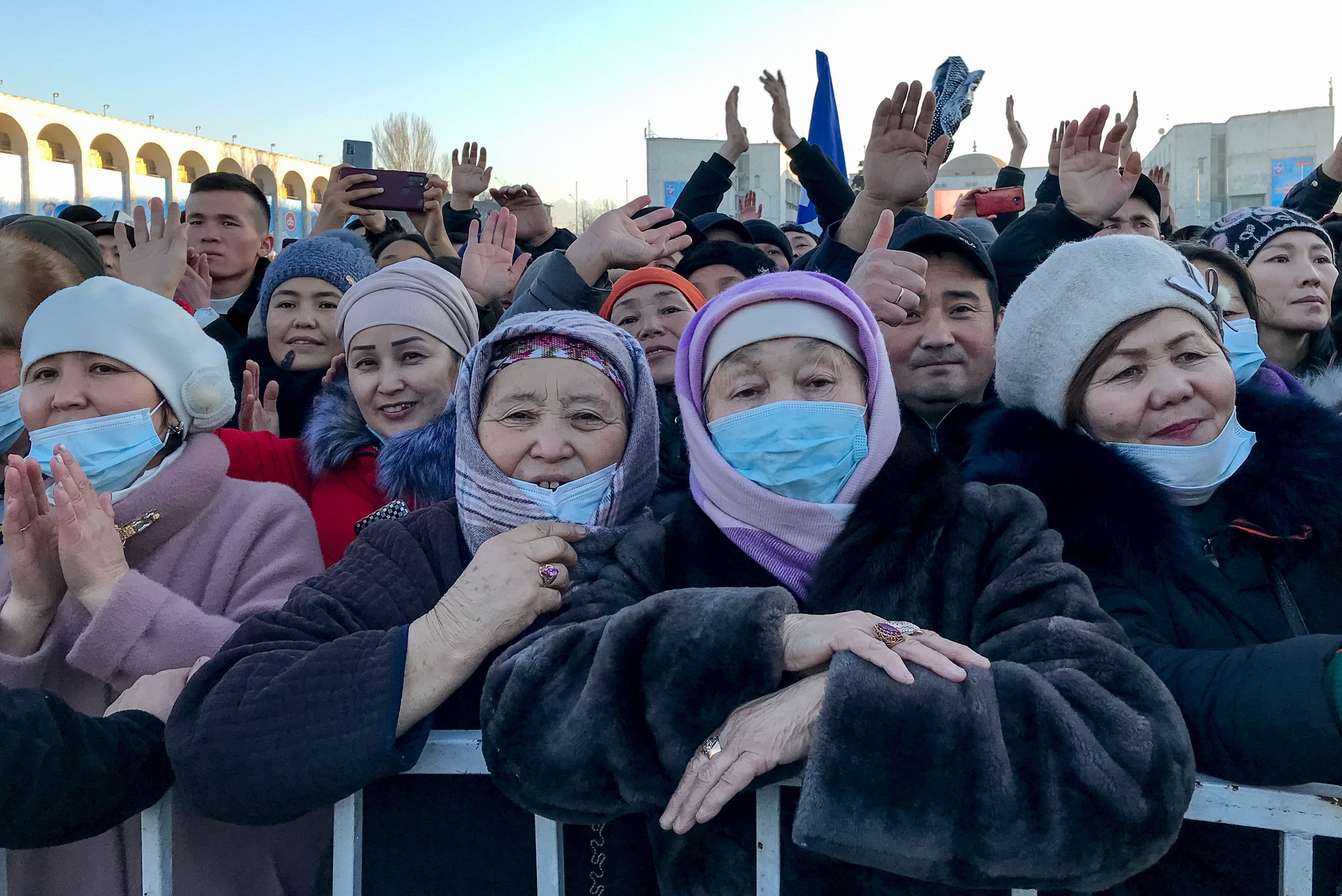Towards Authoritarianism: Kyrgyzstan’s Internal and Foreign Policy Perspectives

The Genesis of Early Elections
After the parliamentary elections on 4 October 2020, mass protests took place in Kyrgyzstan. They were initiated by clans from the north of the country (regional tribal and family structures with political and business connections), leading to changes in the highest positions, including the president and prime minister. The direct cause of the protests were irregularities during the elections. Indirect ones were economic problems, exacerbated by the COVID-19 pandemic, and the centralisation of power in the country by President Jeenbekov, who hails from the south of Kyrgyzstan, leading to the marginalisation of other state institutions and his political opposition representing the interests of northern clans.
As a result of the protests, Jeenbekov was forced to resign, and the functions of president and prime minister were taken over by Japarov, a long-time deputy and the leader of the nationalist Ata Zhurt party from the north of Kyrgyzstan. He had been serving a prison sentence for kidnapping a governor in 2013 but was released during the protests. Japarov ordered early presidential elections and announced that the parliamentary elections would be repeated. He also initiated preparations to change the state system by organising a consultative referendum in parallel with the presidential elections. He then transferred the duties of the president and prime minister to his protégés to run for the elections himself.
New President
Japarov won by gaining about 80% of the votes on turnout of about 40%. In the election campaign, he referred to populist postulates (including the nationalisation of foreign investments) and promised to improve the living standard of the population and fight corruption and crime. The campaign was addressed mainly to the rural population and labour migrants returning from Russia. According to the OSCE, the elections did not meet the requirement of the equal treatment of participants. The organisation has reservations about the widespread intimidation of voters and corruption, Japarov’s use of the public administration for electioneering, and the non-transparent sources of financing of his campaign.
An integral part of Japarov’s programme was the proposal to change the political system, contained in a draft new constitution made public on 17 November 2020. It provides for strengthening executive power, with a strong president. The parliament would be liquidated and replaced by the Kurultai system, an institution of direct democracy traditional for the Kyrgyz people in the form of rallies with blurred powers. In the referendum, 81% of voters supported the change of system.
Internal Policy Perspectives
The rivalry between northern and southern clans is a frequent cause of coups in Kyrgyzstan—the southern clans overthrew President Askar Akayev in 2005, and the northern clans tossed Kurmambek Bakiyev in 2010 and Jeenbekov in 2020. Political parties representing the interests of the southern clans, fragmented and discredited as a result of the rule of Jeenbekov, have not determined a leader since then. This allowed Japarov to strengthen his control over state institutions. To avoid hostility on the part of the southern clans, Japarov includes in the state administration politicians from the south of the country, such as his friend Kamchybek Tashiev, appointed head of the State Committee for National Security. Japarov will continue his conciliation policy towards the southern clans to limit the risk of anti-government insurgency on their part, which is potentially the greatest threat to his rule. For this purpose, he uses ties with the oligarchs, who guarantee him support among regional clans.
Japarov’s ties to the business community make it impossible for him to fight crime and corruption. The oligarchs, his allies, often lead criminal groups that traffic drugs or people and defraud state funds. Some of them, such as groups connected to Raimbek Matraimov, influential in the south, or tied to Kamchibek Kolbayev in the north, are part of the international criminal organisation the “Brother’s Circle”. It unites criminal groups from the post-Soviet states and takes advantage of Kyrgyzstan territory as a safe heaven, thanks to the long-standing protection of the authorities and the weakness of state institutions.
The bad economic situation, exacerbated by the COVID-19 pandemic, is a threat to the stability of Kyrgyzstan and Japarov’s rule. According to the World Bank, Kyrgyzstan’s GDP decreased by around 4.5% in 2020. The incomes of the population from cross-border trade and the shadow economy as well as financial remittances of economic migrants from Russia, constituting about 35% of GDP, fell further. As a result of the pandemic, about 200,000 of the estimated 1 million Kyrgyz migrants in Russia returned home.
Foreign Policy Perspectives
Japarov is not seeking to revise Kyrgyzstan’s foreign policy priorities. Following the example of his predecessors, he will try to balance the influence of Russia and China. Although both countries perceive the change of power as a result of the protests and the coup as a potential threat to their own stability and that of other regimes in the region, Kyrgyzstan is so dependent on them that they are not afraid it will infringe their interests. Therefore, Japarov obtained their support, which strengthens his position on the domestic political scene.
In exchange for its support of Japarov, Russia will increase political pressure on Kyrgyzstan and will demand deeper integration within the Eurasian Economic Union. Kyrgyzstan may also be willing to accept a stronger Russian military presence on its territory, for example, by increasing the Russian contingent at the Kant base, which Russia sees as an instrument for controlling the Kyrgyz authorities.
Kyrgyzstan will seek Chinese loans and investments, which will further deepen its economic dependence on China (it accounts for over 50% of Kyrgyzstan’s foreign debt, 40% of Kyrgyzstan's trade, and around 20% of foreign investments). In return, China will demand that the Kyrgyz authorities agree to investments that are important to them under the Belt and Road Initiative (e.g., the suspended construction of the Naryn logistics centre) or concessions for the extraction of precious and rare minerals).
The change of system proposed by Japarov may have a negative impact on relations with the EU if it results in a significant deterioration of the state of democracy and human rights in that country. Kyrgyzstan was building, with the support of the EU, its image as a leader in democratic reforms in the region by implementing changes in the judiciary, electoral law, minority social integration programmes, and other areas. Support for these efforts was identified as a priority by the EU under the new Central Asia strategy in 2019. The regression in reforms may translate into postponing the ratification of the partnership agreement (EPCA) initialled in 2019 by the EU and Kyrgyzstan.
Conclusions
Given the current lack of political competition, Japarov has a chance to transfer his support from the presidential election to another—this time legally binding—constitutional referendum and parliamentary elections in May this year (e.g., by creating a new social movement). However, this will depend on continued support from the oligarchs and the economic and pandemic situation in the country. Its worsening may lead to an intensification of anti-government protests. Clans from the south, in a situation in which Japarov marginalises their influence, can use social discontent to mobilise voters, which would make it difficult for the new president to change the system and consolidate power. In the event of unfavourable decisions, the southern clans may decide to try to force him out of power.
The systemic changes proposed by Japarov may lead to the evolution of the political system of Kyrgyzstan towards an authoritarian model similar to other Central Asian states. The main EU instrument that may curb Japarov’s authoritarian tendencies will be conditional political and economic support. In the event of another internal crisis in the country, the EU may engage in mediation between the authorities and the opposition in order to maintain its influence on the direction of reforms in Kyrgyzstan.


